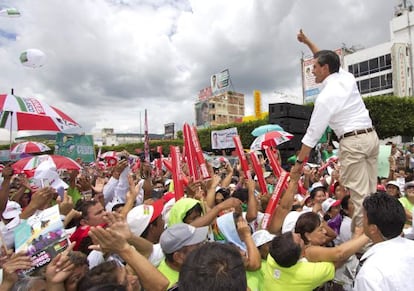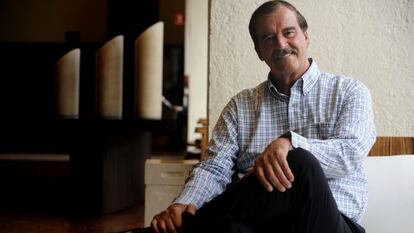Mexico readies to welcome back PRI
Polls show once-dominant party's Peña Nieto leading presidential race

Voters in Mexico go to the polls Sunday in presidential elections that are predicted to sweep the Institutional Revolutionary Party (PRI) back into office, 12 years after it lost its eight-decade grip on power during the country's one-party rule period.
Enrique Peña Nieto, the 46-year-old PRI contender and former governor of the state of Mexico, has campaigned by trying to convince younger voters that his historic party, once plagued with allegations of corruption and cronyism, is not the same organization that their parents voted for. Polls show he is 17 points ahead of his closest rival, Andrés Manuel López Obrador, a 64-year-old leftist who has been using the social networks to promise improved living standards for all Mexicans while also accusing the PRI of violating campaign spending laws.
The ruling PAN party's candidate, Josefina Vázquez Mota, has had a tough time disassociating herself from the current administration of President Felipe Calderón, who Mexicans are blaming for the economic downturn and a bloody war with the drug cartels that have claimed some 60,000 lives since 2006. A fourth candidate, Gabriel Quadri de la Torre, of the New Alliance party, has the slimmest chance of winning, according to the polls. Many Mexicans associate him with the country's most powerful teachers union, which has long been considered a major stumbling block to education reform.
The candidates have proposed different strategies to fighting the cartels: Peña Nieto wants to employ more police and troops in the areas most blighted by crime to curtail kidnappings and murders; López Obrador says he will withdraw the military, which was called out by Calderón, and fight government and police corruption, which has helped fuel the cartels' survival; and Vázquez Mota says she will continue the current strategy of maintaining the armed forces on the streets.
Peña Nieto's most vociferous opponents have been students, assembled under a moment called Yo soy 132 (I am 132), who don't want a return of the PRI, which governed Mexico from 1929-2000.
"They have portrayed him in many ways, but he must have done something to have been able to govern Mexico state," says José Woldenberg, former president of the Federal Electoral Institute, the election watchdog.
Roger Batra, an anthropologist at the Mexico's National Autonomous University (UNAM), said that while Peña Nieto may appear to be "uncultured," he believes he has the most "experience in government." The PRI candidate was ridiculed by his opponents in February when he confused the names of authors and novels at the International Book Fair in Guadalajara.
For her part, 51-year-old Vázquez Mota was slow to get her campaign engines running, according to her supporters, who say she only became more aggressive after the last debate on June 10. "Her campaign team has not been very professional; in fact, they look like amateurs," said Rubén Aguilar, spokesman for ex-President Vicente Fox (2000-2006) also of the PAN.
Soledad Loaeza, a researcher at the prestigious Colegio de México, said that PAN, and the conservative movement in general, is facing "a bleak future."
"They lost the opportunity of forming a true political class," she said.
For López Obrador, this will be his second attempt at the presidency. In 2006, he lost the race to Calderón by less than one percent, setting off nationwide protests by his supporters who still believe PAN stole the last elections. But his discourse is softer than it was during the last race.
Famed Mexican novelist Elena Poniatowska says the leftist candidate, as well as the Yo soy 132 student movement, has brought "a breath of fresh air" to the campaign.
The student movement was spawned after Peña Nieto's campaign had charged that student hecklers were planted by rivals when he appeared at a university. A group of 131 young people posted a YouTube video showing their student IDs, and after it went viral, others came forward asking to become the 132nd student member.
"Enrique Peña Nieto represents more of the same: govern for a few who want to get rich off the back of the poorest Mexicans by deceiving them," she said. "Andrés Manuel López Obrador is not crassly ambitious; he knows and loves his country. His merits outweigh his mistakes and his personal defects."
"The army should return to barracks"

Twelve years ago, Vicente Fox and his conservative National Action Party (PAN) put an end of nearly 70 years of uninterrupted rule in Mexico by the Institutional Revolutionary Party (PRI) when he was elected president. But now Fox has turned his back on his comrades and is supporting the PRI's candidate Enrique Peña Nieto in Sunday's general elections.
"He governed democratically in the state of Mexico," Fox said in an EL PAÍS interview. "He has come to realize, just as I did, that you either have or don't have the capacity to do things - but he is not looking to establish a dictatorship."
The former president insists that many of Mexico's problems are the fault of lawmakers in Congress, especially the radical left. "The last three presidential administrations - Zedillo, Fox and Calderón - ended in frustrations because as minority governments it was impossible for us to get our proposals passed in Congress because of the opposition radical left, which doesn't care about Mexico," he said. "We have lost 18 years without any energy, tax, labor or education reforms."
Fox is especially critical of Andrés Manuel López Obrador, the leftist candidate, whom he calls "López-Chávez" in reference to Venezuelan President Hugo Chávez. "The man who is completely out of touch is López Obrador, who thinks like a populist - with demagoguery, deceit and lies - and wants to impose his own laws. Even today, at 17 points behind [Peña Nieto] in the polls, he claims that he is in the lead. How can the people believe this character?"
Fox didn't have positive words for his successor, the current President Felipe Calderón, whom he blames for calling out the army in 2006 to fight drug traffickers and for taking "Mexico back into poverty" by not helping to stimulate jobs and growth. According to the National Council for Evaluation of Social Development Policy, poverty has edged up from 44.5 percent to 46.2 percent between 2008 and 2010. "There have been a lot of human rights violations [...] I think the army should be called back to the barracks as soon as possible, and drug consumption should also be legalized as soon as possible in Mexico and, above all, in the United States."
Fox said that he doesn't feel that he has betrayed his PAN party by coming out in favor of Peña Nieto. "One of the fundamental things about democracy is the option to alternate. You cannot pretend that PAN will be there forever; that is not democratic."
Tu suscripción se está usando en otro dispositivo
¿Quieres añadir otro usuario a tu suscripción?
Si continúas leyendo en este dispositivo, no se podrá leer en el otro.
FlechaTu suscripción se está usando en otro dispositivo y solo puedes acceder a EL PAÍS desde un dispositivo a la vez.
Si quieres compartir tu cuenta, cambia tu suscripción a la modalidad Premium, así podrás añadir otro usuario. Cada uno accederá con su propia cuenta de email, lo que os permitirá personalizar vuestra experiencia en EL PAÍS.
¿Tienes una suscripción de empresa? Accede aquí para contratar más cuentas.
En el caso de no saber quién está usando tu cuenta, te recomendamos cambiar tu contraseña aquí.
Si decides continuar compartiendo tu cuenta, este mensaje se mostrará en tu dispositivo y en el de la otra persona que está usando tu cuenta de forma indefinida, afectando a tu experiencia de lectura. Puedes consultar aquí los términos y condiciones de la suscripción digital.








































